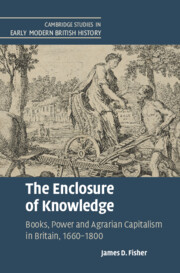Book contents
- The Enclosure of Knowledge
- Cambridge Studies in Early Modern British History
- The Enclosure of Knowledge
- Copyright page
- Dedication
- Contents
- Figures
- Tables
- Acknowledgements
- Notes
- Abbreviations
- Introduction
- Chapter 1 Rethinking Agricultural Books, Knowledge and Labour
- Chapter 2 Learning without Books
- Chapter 3 Standing on the Shoulders of Peasants
- Chapter 4 Learning without Labour
- Chapter 5 Dividing Head and Hand
- Chapter 6 Monopolising Knowledge
- Chapter 7 The Master Should Know More
- Conclusion
- Appendix
- Bibliography
- Index
Conclusion
New Histories of Knowledge
Published online by Cambridge University Press: 07 July 2022
- The Enclosure of Knowledge
- Cambridge Studies in Early Modern British History
- The Enclosure of Knowledge
- Copyright page
- Dedication
- Contents
- Figures
- Tables
- Acknowledgements
- Notes
- Abbreviations
- Introduction
- Chapter 1 Rethinking Agricultural Books, Knowledge and Labour
- Chapter 2 Learning without Books
- Chapter 3 Standing on the Shoulders of Peasants
- Chapter 4 Learning without Labour
- Chapter 5 Dividing Head and Hand
- Chapter 6 Monopolising Knowledge
- Chapter 7 The Master Should Know More
- Conclusion
- Appendix
- Bibliography
- Index
Summary
This conclusion reflects upon the contribution of this study to different spheres of history. First, it considers how the analysis changes our understanding of agricultural books in early modern Britain, by revisiting the advantages of the sociological approach compared with the enlightenment model. It restates the core argument about the enclosure of knowledge in light of the detailed arguments of specific chapters. Second, it suggests that this study opens up space for a new field of research: the social history of agricultural knowledge. It discusses how the current arguments about book-knowledge can be tested, but also how alternative approaches might go beyond the focus on books. Third, it considers the implications for general histories of knowledge and capitalism, which is illustrated through three key concepts: the real subsumption of labour, deskilling and commodification. It argues that the story of early English agricultural literature is not only relevant, but foundational to the history of capitalism in general.
Keywords
- Type
- Chapter
- Information
- The Enclosure of KnowledgeBooks, Power and Agrarian Capitalism in Britain, 1660–1800, pp. 263 - 275Publisher: Cambridge University PressPrint publication year: 2022

